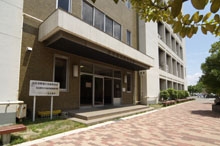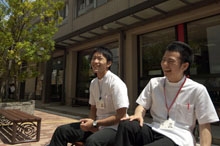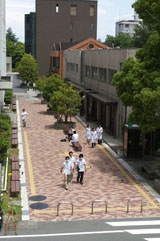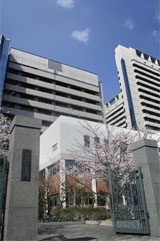Faculties, Graduate Schools and Institutions
Medical School

Medical School
(Fundamental Education)
Nagoya City University Medical School was founded as Nagoya City Women ' s Medical College in 1943. After the school underwent major restructuring and two renamings, it took its present form in 1950. The school is composed of 41 departments, consisting of 20 clinical sciences and 21 basic medical sciences, including the 5 research divisions of the Institute of Molecular Medicine. It also operates the University Hospital and two major research facilities, Laboratory of Radioisotopes and Center for Experimental Animal Science.

The Medical School offers a 6-year course to obtain a Doctor of Medicine (M.D.). Since its foundation in 1943, 3867 students have graduated as of April 2006. They have been engaged in various types of medical practice and services, including hospitals, family practice, medical education, medical research and administration of medicare systems.
Graduate School of Medical Sciences
Nagoya City University Graduate School of Medical Sciences provides a four-year course designed for a Ph.D. degree in Medical Sciences. The program dates back to 1961, and currently has a faculty of more than 40 full-professors. The Graduate School covers research fields in the medical sciences intensively, extensively and interactively, so that every student will receive a high-level comprehensive education in the medical sciences and be able to choose original, creative and high-priority research themes for his/her Ph.D. project.
Eligible candidates are those with an M.D., D.D.S., or D.V.M., who have a master ' s or equivalent degree in any field in the Japanese education system, or who have a comparable education background in overseas education systems. International student applicants are normally required to have either an 18-year or longer education along with an M.D., D.D.S., or D.V.M., a master ' s or equivalent degree, or a 16-year or longer education plus a 2-year or longer research career. Those who have other compatible or higher educational backgrounds may also qualify.
The program has recently undergone major revisions so as to now comprise four major courses: 1) Structure and Function in Biomedical Sciences, 2) Biosignaling and Regulation in Medical Sciences, 3)Biodefense System and Comprehensive Medical Sciences, and 4) Community Medicine, Environmental Health Sciences and Medical Education.
Eligible candidates are those with an M.D., D.D.S., or D.V.M., who have a master ' s or equivalent degree in any field in the Japanese education system, or who have a comparable education background in overseas education systems. International student applicants are normally required to have either an 18-year or longer education along with an M.D., D.D.S., or D.V.M., a master ' s or equivalent degree, or a 16-year or longer education plus a 2-year or longer research career. Those who have other compatible or higher educational backgrounds may also qualify.
The program has recently undergone major revisions so as to now comprise four major courses: 1) Structure and Function in Biomedical Sciences, 2) Biosignaling and Regulation in Medical Sciences, 3)Biodefense System and Comprehensive Medical Sciences, and 4) Community Medicine, Environmental Health Sciences and Medical Education.
promotion video

KawasumiCampus

KawasumiCampus Front Entrance

Nagoya City Hospital



